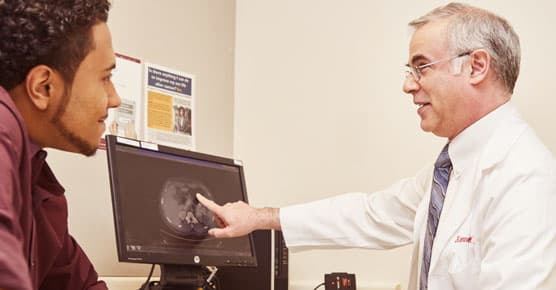Melanoma Screening and Diagnosis

Early detection is important because melanoma can usually be cured in its early stages. But if it is not diagnosed early, melanoma may spread from the skin to other areas of the body, including the lymph nodes, liver, lungs, bones and brain.
Monitoring for High-Risk Patients
You may benefit from close monitoring by a melanoma expert the University of Chicago Medicine if you have:
- A mole that is larger than a pencil eraser
- A mole that has an irregular shape or uneven color (called a dysplastic nevus)
- More than 50 moles
- A family or personal history of melanoma
- A history of severe or blistering sunburns, especially at a young age
- New or changing moles
- Other types of skin cancer (basal cell carcinoma or squamous cell carcinoma)
- Fair skin and light-colored eyes
Having a skin cancer screening at least once a year can help you catch early signs of melanoma and other skin cancers. At UChicago Medicine, our dermatologists have specialty training in skin cancer detection. When needed, they use instruments called dermatoscopes that can accurately detect melanoma and other skin cancers. These noninvasive, handheld devices use polarized light, magnification so doctors can have a better view of your skin.
Help for People with Weakened Immune Systems
If your immune system is weak, you also have a higher risk for developing melanoma. This could happen if you have:
- An organ transplant
- Cancer or are undergoing chemotherapy
- Human immunodeficiency virus (HIV)
If you are at risk for melanoma because of a weakened immune system, we’ll work closely with your other specialists to design a personalized plan to reduce your cancer risks. This may include more frequent skin cancer screenings, depending on your health and other risk factors.
Melanoma in People of Color
Even though people with fair skin are more likely to develop melanoma, people with darker skin types can also get melanoma. Locations where melanoma can develop include beneath nails or on the palms of the hands and soles of the feet. When melanoma develops in people with darker skin, it is often diagnosed in the late stages when it is more likely to be deadly.
At the University of Chicago Medicine, our skilled dermatologists are experts in skin cancer screening in people of all races and ethnicities. Because we serve many people of color in our community, we understand what to look for when screening for melanoma.
Mole Mapping
If you are at high risk for melanoma, you may also benefit from mole mapping, which is only available at a few academic medical centers in the Chicago area. Mole mapping uses more advanced technology than skin cancer screenings and can offer peace of mind if you have many moles or have “risky” moles that are an unusual size, shape or color.
This painless, noninvasive technique involves tracking changes in your moles over time with digital photography. With mole mapping, we can catch melanomas earlier and minimize the need for unnecessary biopsies.
Once you have had a consultation to determine if mole-mapping is right for you, we can schedule your session. Here’s what you can expect during mole mapping:
- A member of our skin cancer team will take up to 20 digital photos of your entire skin surface. Then, the dermatologist will look for any suspicious moles that should be monitored more closely. Close-up digital dermatoscopic photos of any concerning moles may also be taken. The process takes about 30 minutes.
- If the dermatologist discovers a change in a mole from a previous visit, it could be an early sign of melanoma. If so, the dermatologist may take a sample of the mole — a procedure known as a biopsy — on the same day as your exam.
- Photos are stored in a secure database, so they can be reviewed by your dermatologist for changes at your next visit — usually six to 12 months later.
Schedule a mole-mapping consultation
Expertise in Diagnosing Melanoma
UChicago Medicine is home to some of the most experienced dermatopathologists in the country. These specialized doctors are experts in diagnosing melanoma at its earliest stages when it is most treatable. When you come to UChicago Medicine for a biopsy, your dermatologist will work closely with the dermatopathology team to reach an accurate diagnosis.
Our dermatopathologists are highly skilled in using immunohistochemistry (IHC) tests to distinguish melanoma from other tumors, which is essential for effective treatment. For unusual or difficult-to-diagnose tumors, our skilled pathologists use advanced molecular tests and techniques honed through our extensive research to better understand your melanoma and guide treatment.

Cancer Care Second Opinions
Request a second opinion from UChicago Medicine experts in cancer care.

Participate in a Clinical Trial
UChicago Medicine melanoma cancer experts are actively conducting clinical trials of new and promising treatments.

Harnessing the Immune System to Fight Cancer
Immunotherapy — a treatment that mobilizes the body's own defense system to fight diseases — is revolutionizing the way we treat cancer.
